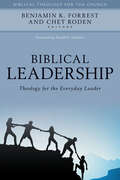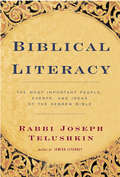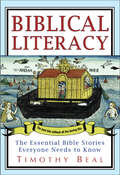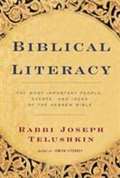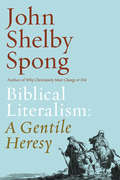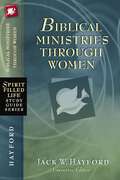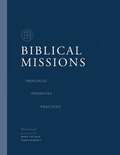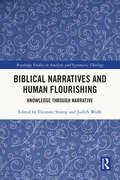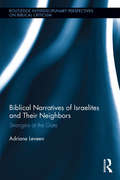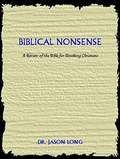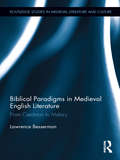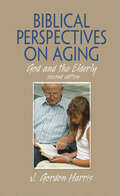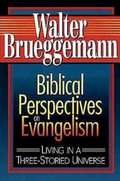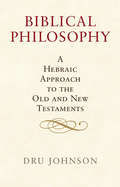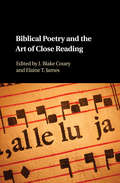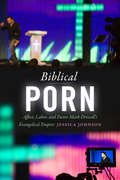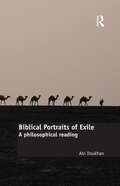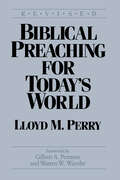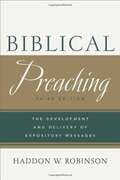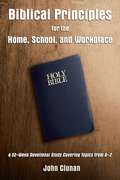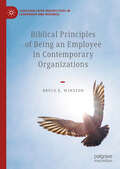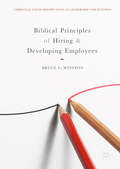- Table View
- List View
Biblical Leadership: Theology for the Everyday Leader
by Benjamin K. ForrestBiblical Leadership takes the best of evangelical scholarship to make the leadership lessons of Scripture tangible for today's readers. All contributors are biblical scholars who not only think seriously about the texts covered in their individual chapters, but have committed their lives to teaching and living the truths therein. This volume walks through the sections of the Bible, gleaning insights from each biblical writer. Every chapter analyzes the original setting of the writing, extrapolates the leadership principles in the text, and provides advice on applying that theology of leadership. Presented in everyday language understandable to both professionals and practitioners, these lessons will equip current and upcoming leaders to make a Christlike impact.
Biblical Literacy
by Joseph TelushkinAs he did so brilliantly in his bestselling book, jewish literacy,Joseph Teluslikin once again mines a subject of, Jewish history and religion so richly that his book becomes an inspiring companion and a fundamental reference. In Biblical Lileracy, Telushkin turns his attention to the Hebrew Bible (also known as the Old Testament), the most iniluential series of books in human history. Along with the Ten Commandments, the Bible's most famous document, no piece of legislation ever enacted has influenced human behavior as much as the biblical injunction to "Love your neighbor as yourself." No political tract has motivated human beings in so many diverse societies to fight for political freedom as the Exodus story of God's liberation of the Israelite slaves--which shows that God intends that, ultimately, people be free.The Bible's influence, however, has conveyed as much through its narratives as its laws. Its timeless and moving tales about the human condition and man's relationship to God have long shaped Jewish and Christian notions of morality, and continue to stir the conscience and imagination of believers and skeptics alike.There is a universality in biblical stories:The murder of Abel by his brother Cain is a profound tragedy of sibling jealousy and family love gone awry (see pages 11-14).Abraham',s challenge to God to save the lives of the evil people of Sodom is a fierce drama of man in confrontation with God, suggesting the human right to contend with the Almighty when it is feared He is acting unjustly (see pages 32-34).Jacob's, deception of his blind father, Isaac raises the timeless question: Do the ends justify the means when the fate of the world is at stake (see pages 46-55).Encyclopedia in scope, but dynamic and original in its observations and organization, Biblical Lileracy makes available in one volume the Bible's timeless stories of love, deceit, and the human condition; its most important laws and ideas; and an annotated listing of all 613 laws of the Torah for both layman and professional, there is no other reference work or interpretation of the Bible quite like this Stunning volume.
Biblical Literacy: The Essential Bible Stories Everyone Needs to Know
by Timothy Beal“The Bible . . . is a locked treasure for those unfamiliar with the Scriptures. . . . Beal offers a key with his accessible guide.” —Cleveland Plain DealerTimothy Beal’s Biblical Literacy is a one-stop course in the Bible passages and background information that everyone needs to know to navigate our nuanced cultural landscape—from devout believers to decided atheists, average citizens to pop-culture aficionados. Like Religion in America, Religion and its Monsters, and his other highly acclaimed books, Beal’s Biblical Literacy is a must-have handbook for understanding today’s world.“With skill and insight, Timothy Beal has given us a great gift: a lucid and engaging introduction to the most important book ever published.” —Jon Meacham, Pulitzer prize-winning author of American Lion“Tim Beal has written about the rich, thick connections between the Bible and popular culture . . . In a society of deep and dangerous disconnects, the connects of this book serve exceedingly well.” —Walter Brueggemann, author of The Prophetic Imagination“A readable, informative and timely book.” —Harvey Cox, Hollis Research Professor of Divinity, Harvard University, and author of The Future of Faith“Here you will find numerous gems of the Jewish and Christian Scriptures, along with pithy, helpful, and at times even witty, introductions.” —Bart D. Ehrman, James A. Gray Professor of Religious Studies, University of North Caroline, Author of Jesus, Interrupted“Beal . . . makes a well-stated case that a knowledge of the Bible is essential to understanding our culture. His book will serve as a handy first step toward that goal— especially for the reader who may feel intimidated by ‘the boring bits.’” —Bookpage
Biblical Literacy: The Most Important People, Events, and Ideas of the Hebrew Bible
by Joseph TelushkinEncyclopedic in scope, but arranged by people, events, laws and ideas, this reference makes available in one volume all the Bible's timeless stories of love, greed, and the human condition; stories that form the basis for our sense of morality. It not only provides a complete education in all the books of the Hebrew Bible but it conveys their psychological and emotional truths as well.
Biblical Literalism: A Gentile Heresy
by John Shelby SpongA global and pioneering leader of progressive Christianity and the bestselling author of Why Christianity Must Change or Die and Eternal Life explains why a literal reading of the Gospels is actually heretical, and how this mistaken notion only entered the church once Gentiles had pushed out all the Jewish followers of Jesus.A man who has consciously and deliberately walked the path of Christ, John Shelby Spong has lived his entire life inside the Christian Church. In this profound and considered work, he offers a radical new way to look at the gospels today as he shows just how deeply Jewish the Christian Gospels are and how much they reflect the Jewish scriptures, history, and patterns of worship. Pulling back the layers of a long-standing Gentile ignorance, he reveals how the church's literal reading of the Bible is so far removed from these original Jewish authors' intent that it is an act of heresy.Using the Gospel of Matthew as a guide, Spong explores the Bible's literary and liturgical roots--its grounding in Jewish culture, symbols, icons, and storytelling tradition--to explain how the events of Jesus' life, including the virgin birth, the miracles, the details of the passion story, and the resurrection and ascension, would have been understood by both the Jewish authors of the various gospels and by the Jewish audiences for which they were originally written. Spong makes clear that it was only after the church became fully Gentile that readers of the Gospels took these stories to be factual, distorting their original meaning.In Biblical Literalism: A Gentile Heresy, Spong illuminates the gospels as never before and provides a better blueprint for the future than where the church's leaden and heretical reading of the story of Jesus has led us--one that allows the faithful to live inside the Christian story in the modern world.thor of Original Blessing"Jack Spong confounds biblical literalists by being profoundly biblical. This exciting book is liberating for those looking for a rational and authentic Christian faith that honors its biblical roots and is an essential building block in the search for a new Christianity for a new world."--Peter Francis, warden and director of Gladstone's Library, Wales"A brilliant challenge to biblical literalism, Bishop Spong reveals the tragic consequences of idolatry of the written word and why it matters today. A timely, important book."--Michael Dowd, author of Thank God for Evolution"After reading Spong's newest book, it will be difficult to read Matthew or any of the gospels in quite the same way again. He's done an amazing job of explaining how the book of Matthew was written as weekly liturgies for the Jewish synagogue year. A wonderful book."--Fred C. Plumer, president of ProgressiveChristianity.org
Biblical Ministries Through Women: God's Daughters and God's Work (Spirit-Filled Life Study Guide Series)
by Jack HayfordGod has a mission and ministry for every believer, and women have always been called to make a significant contribution to the ministry of the church. This study guide explores the role of women's ministry in the Bible and the church today. Readers will learn about the unique and dynamic contributions of many key women in the Bible, and find guidance for discovering their own role and ministry in the body of Christ.The Spirit-Filled Life® study guides are perfect companions to the New Spirit-Filled Life Study Bible or for use on their own. Their interactive approach offers an in-depth look at practical living in God's kingdom and challenges users to examine and live their daily lives in the light of God's Word.Features include:12 lessons, plus an introduction to experiencing the hope and purpose that come with living with God's covenants in viewFoundational, practical helps like Kingdom Extras, Probing the Depths, and Word Wealth in each lesson Spirit-Filled Life® Study Guides sold to date: More than 1.5 million
Biblical Missions Workbook: Principles, Priorities, and Practices
by Thomas NelsonThe Biblical Missions Workbook brings together experienced and biblically focused missions voices to equip evangelical students worldwide for a faithful gospel witness today.The workbook is a companion resource to the comprehensive textbook Biblical Missions: Principles, Priorities, and Practices. Both volumes are produced by The Master's Academy International (TMAI), a nonprofit organization and part of the John MacArthur family of ministries.The 24 lessons draw from the textbook's 100 worldwide voices with step-by-step guidance to make biblical missions actionable. These lessons not only reinforce the most critical concepts of missions but also provide opportunities for field implementation in any global context.Local churches around the world, as well as likeminded Christian colleges, seminaries, and missions organizations, are invited to follow these proven pathways to fulfill the Great Commission faithfully.
Biblical Narrative and the Formation of Rabbinic Law
by Jane L. Kanarek"This book presents a new framework for understanding the relationship between biblical narrative and rabbinic law. Drawing on legal theory and models of rabbinic exegesis, Jane L. Kanarek argues for the centrality of biblical narrative in the formation of rabbinic law. Through close readings of selected Talmudic and midrashic texts, Kanarek demonstrates that rabbinic legal readings of narrative scripture are best understood through the framework of a referential exegetical web. She shows that law should be viewed as both prescriptive of normative behavior and as a meaning-making enterprise. By explicating the hermeneutical processes through which biblical narratives become resources for legal norms, this book transforms our understanding of the relationship of law and narrative as well as the ways in which scripture becomes a rabbinic document that conveys legal authority and meaning"--
Biblical Narratives and Human Flourishing: Knowledge Through Narrative (Routledge Studies in Analytic and Systematic Theology)
by Eleonore Stump Judith WolfeBiblical narratives include some of the most important and influential narratives in human history, shaping human understanding of the most basic questions of human life as lived individually or in social association with others. These narratives have lasted for so many centuries because they offer deep insights into the nature of the human condition and human flourishing. This volume includes chapters by accomplished philosophers and theologians who bring their expertise to bear on biblical narratives to show the way in which each narrative contributes something distinctive to our understanding of human flourishing. They broaden the ongoing work in analytic theology with a new focus on narrative and the knowledge of persons in philosophical-theological biblical exegesis. They also illustrate the narrative cognition that this methodology can provide. The book will be of interest to scholars of philosophy, theology, and biblical studies.
Biblical Narratives of Israelites and their Neighbors: Strangers at the Gate (Routledge Interdisciplinary Perspectives on Biblical Criticism)
by Adriane LeveenThroughout the Hebrew Bible, strangers are indispensable to the formation of a collective Israelite identity. Encounters between the Israelites and their neighbors are among the most urgent matters explored in biblical narratives, yet relatively little scholarly attention has been paid to them. This book corrects that imbalance by carrying out close readings of the accounts of Israel’s myriad interactions with the surrounding nations. The book follows the people of Israel after they leave Egypt, as they wander in the wilderness, cross over into the land, become a unified people Israel and face explusion from that land. The introduction lays the groundwork for a literary reading. Each chapter that follows highlights a distinct people and the issues that they create. For example, Jethro, father-in-law of Moses and a Midian priest, provides a model of collaboration, while Samson’s behavior triggers a cycle of violent retribution. These engaging stories illustrate the perceived dangers of idolatry and military oppression, but also convey lessons in governance, cultural innovation and the building of alliances. This book is vital reading for Biblical scholars and interested readers who want to deepen their understanding of the Israelites’ relationship with neighboring peoples. It will also be of keen interest to academics who work in ancient history and culture.
Biblical Nonsense: A Review of the Bible for Doubting Christians
by Jason LongBiblical Nonsense is a broad look at the tremendous problem of associating divinity with the world’s most popular book. This part-philosophical, part-scientific overview explores the Bible’s divine treachery, scientific mistakes, historical errors, false prophecies, and comical absurdities. Biblical Nonsense also expands beyond these standard reasons for skepticism by tackling the rationale behind the emergence and perpetuation of Christianity, psychological and sociocultural reasons that drive Christians to cling to their beliefs, and illogical methods of argumentation invoked in the defense of the Bible. <P><P> Author Dr. Jason Long is a former Christian who condenses the most significant biblical problems into this single volume. Unlike other books in the field that delve into only one topic, this manuscript, comprehensible even to those who have never opened a Bible, is a full-fledged attempt to demonstrate that God’s supposed word is a product of human minds, not divine inspiration. Dr. Long’s fresh experiences in the church and advanced levels of educational enlightenment make him the perfect individual to present this vehemently unpopular, yet undeniably appealing topic.
Biblical Paradigms in Medieval English Literature: From Cædmon to Malory
by Lawrence BessermanThis book examines the intricate and unusual relationship between the sacred and secular spheres of English medieval culture, positing that the assimilation of sacred and secular motifs could be in either direction, or even in both directions. That is, medieval English writers could appropriate biblical paradigms to express secular themes, and vice versa. Codicological, psychoanalytic, feminist, and new historicist insights inform readings of Beowulf, Middle English lyric poetry, the Gawain-poet, Chaucer, and Malory, among others. Besserman elucidates the structural and thematic complexity of the integration of biblical and biblically derived sacred diction, imagery, character types, and themes in the works under consideration, identifying within them new biblical sources and analogues and providing fresh insights into the contextual meaning and significance of the biblical paradigms they deploy. This book highlights the shaping influence of biblical and biblically derived sacred paradigms on exemplary literature produced in the middle Ages.
Biblical Perspectives on Aging: God and the Elderly, Second Edition
by J. Gordon HarrisAs the population of older Americans grows, meaningful perspectives on aging are needed by both the young and the old. Biblical Perspectives on Aging: God and the Elderly takes a detailed look at the views of aging presented in the Old and New Testaments. This wide ranging and insightful survey encompasses not only the entire Bible but also interpretations of sacred Middle Eastern and Judaic documents. This new expanded edition of the original classic text adds thorough discussions of the wisdom of the Bible and Jewish literature with ways to interpret these readings and what they teach about spirituality and growing older.Approaches to aging issues have changed in recent years. With the average American lifespan increasing, the view of old age as a solitary time of waiting has been pushed aside. So too has the assumption that the elderly simply want to remember “the good old days.” This updated edition of Biblical Perspectives on Aging: God and the Elderly has expanded its scope to incorporate and address the effects of these changing views. This sweeping study of the Bible’s positive treatment of aging and elderly figures sheds new light on contemporary society’s negative view of the elderly and what can be done about it. Clear examples from both Scripture and literature provide a wealth of understanding, comfort, and wisdom to everyone interested in aging and the Bible. In addition, this new edition explores the changing relationships that exist among aging, hermeneutics, mentoring, and spirituality. The new insights revealed here reinvigorate the challenge against ageism and traditional pictures of old age as a time of withdrawal and living in the past.Among the issues explored in Biblical Perspectives on Aging: God and the Elderly are aging experiences and the Bible, biblical theology and its role in social support for the elderly, hermeneutics and old age, spirituality and its relationship to aging, cross-generational relationships and mentoring, and a detailed index of Old and New Testament Scripture references.Accessible and concise, with compelling arguments and numerous examples, Biblical Perspectives on Aging: God and the Elderly is an ideal resource for pastors, seminary students, professionals, and leaders of programs for the elderly. It shows both young and old that while aging may not be easy, Biblical theology can ease some of its mystery.
Biblical Perspectives on Evangelism: Living in a Three-Storied Universe
by Walter BrueggemannIn this timely and provocative work, Walter Brueggemann applies his experience and skills in the area of biblical interpretation to the theme of evangelism. He argues for the importance of considering afresh how the Bible itself thinks and speaks about evangelism, how it enacts the dramatic claims of the "good news."Brueggemann here describes evangelism as a drama in three scenes, concerning (1) God's victory over the forces of chaos and death, (2) the announcement of that victory, and (3) its appropriation by those who hear the announcement. This same dramatic sequence, as he shows, is many time re-enacted in the Bible; the times and circumstances of the re-enactment may differ, but the essential message, as well as the structure of its presentation, remains the same.
Biblical Philosophy: A Hebraic Approach to the Old and New Testaments
by Dru JohnsonIn Biblical Philosophy, Dru Johnson examines how the texts of Christian Scripture argue philosophically with ancient and modern readers alike. He demonstrates how biblical literature bears the distinct markers of a philosophical style in its use of literary and philosophical strategies to reason about the nature of reality and our place within it. Johnson questions traditional definitions of philosophy and compares the Hebraic style of philosophy with the intellectual projects of ancient Egypt, Mesopotamia, and Hellenism. Identifying the genetic features of the Hebraic philosophical style, Johnson traces its development from its hybridization in Hellenistic Judaism to its retrieval by the New Testament authors. He also shows how the Gospels and letters of Paul exhibit the same genetic markers, modes of argument, particular argument forms, and philosophical convictions that define the Hebraic style, while they engaged with Hellenistic rhetoric. His volume offers a model for thinking about philosophical styles in comparative philosophical discussions.
Biblical Poetry and the Art of Close Reading
by J. Blake Couey Elaine T JamesThis volume explores the aesthetic dimensions of biblical poetry, offering close readings of poems across the Hebrew Bible/Old Testament. Composed of essays by fifteen leading scholars of biblical poetry, it offers creative and insightful close readings of poems from across the canon of the Hebrew Bible/Old Testament (Psalms, wisdom poetry, Song of Songs, prophecy, and poetry in biblical narrative). The essays build on recent advances in our understanding of biblical poetry and engage a variety of theoretical perspectives and current trends in the study of literature. They demonstrate the rewards of careful attention to textual detail, and they provide models of the practice of close reading for students, scholars, and general readers. They also highlight the rich aesthetic value of the biblical poetic corpus and offer reflection on the nature of poetry itself as a meaningful and enduring form of art.
Biblical Porn: Affect, Labor, and Pastor Mark Driscoll's Evangelical Empire
by Jessica JohnsonBetween 1996 and 2014, Mark Driscoll's Mars Hill Church multiplied from its base in Seattle into fifteen facilities spread across five states with 13,000 attendees. When it closed, the church was beset by scandal, with former attendees testifying to spiritual abuse, emotional manipulation, and financial exploitation. In Biblical Porn Jessica Johnson examines how Mars Hill's congregants became entangled in processes of religious conviction. Johnson shows how they were affectively recruited into sexualized and militarized dynamics of power through the mobilization of what she calls "biblical porn"—the affective labor of communicating, promoting, and embodying Driscoll's teaching on biblical masculinity, femininity, and sexuality, which simultaneously worked as a marketing strategy, social imaginary, and biopolitical instrument. Johnson theorizes religious conviction as a social process through which Mars Hill's congregants circulated and amplified feelings of hope, joy, shame, and paranoia as affective value that the church capitalized on to grow at all costs.
Biblical Portraits of Exile: A philosophical reading (Routledge New Critical Thinking in Religion, Theology and Biblical Studies)
by Abi DoukhanExile constitutes one of the most central experiences in the Bible, notably in the book of Genesis. The question has rarely been asked however as to why exile plays such an important role in the lives of Biblical characters. Biblical Portraits of Exile proposes a philosophical reading largely inspired by the philosophy of Emmanuel Levinas of the experience of exile in the book of Genesis. Focusing on the 8 central figures of exile Adam, Eve, Cain, the sons of Shem, Abraham, Rebekah, Jacob and the sons of Levy the book draws out the ethical and redemptive implications of exile and thereby paves the way for a renewed description of the human subject, one that situates ethics at its very core.
Biblical Preaching for Today's World
by Lloyd Perry"Biblical preaching has not outgrown its usefulness. The methods may vary, but the message remains the same. God's challenge and call to the preacher still come through loud and clear: 'Preach the Word.'"Lloyd M. Perry's Biblical Preaching for Today's World has been helping pastors and speakers preach the Word since 1973. Although the principles Perry originally established are timeless, the needs and concerns of audiences are always changing. To help pastors preach more effectively to today's congregations, Perry has updated his original manuscript. He offers pastors help in understanding and adjusting to the effects television has had on an audience's listening skills. Historical references throughout each chapter will also help preachers learn from yesterday's teachers and styles. Biblical Preaching for Today's World continues to offer sound, time-tested principles for preaching, regardless of the preacher's style. Filled with helpful suggestions, annotated outlines, and solid documentation, it is invaluable reading for all who aspire to preach the Word.
Biblical Preaching for Today's World
by Lloyd Perry"Biblical preaching has not outgrown its usefulness. The methods may vary, but the message remains the same. God's challenge and call to the preacher still come through loud and clear: 'Preach the Word.'"Lloyd M. Perry's Biblical Preaching for Today's World has been helping pastors and speakers preach the Word since 1973. Although the principles Perry originally established are timeless, the needs and concerns of audiences are always changing. To help pastors preach more effectively to today's congregations, Perry has updated his original manuscript. He offers pastors help in understanding and adjusting to the effects television has had on an audience's listening skills. Historical references throughout each chapter will also help preachers learn from yesterday's teachers and styles. Biblical Preaching for Today's World continues to offer sound, time-tested principles for preaching, regardless of the preacher's style. Filled with helpful suggestions, annotated outlines, and solid documentation, it is invaluable reading for all who aspire to preach the Word.
Biblical Preaching for Today's World (Revised Edition)
by Lloyd M. PerryRevised to suit the requirements of the present day listeners, the book contains Biblical preaching for today's world. This book provides both new and experienced preachers with the concepts, structures, and resources essential for effective biblical preaching. It is the product of many years of Dr. Perry's intensive study, gifted teaching, Spirit-directed preaching, and practical writing.
Biblical Preaching: The Development and Delivery of Expository Messages
by Haddon W. RobinsonThis bestselling text by Haddon Robinson, considered by many to be the "teacher of preachers," has sold over 300,000 copies and is a contemporary classic in the field. <p><p>It offers students, pastors, and Bible teachers expert guidance in the development and delivery of expository sermons. This new edition has been updated throughout and includes helpful exercises.
Biblical Principles for the Home, School, and Workplace: A 52-Week Devotional Study Covering Topics from A – Z
by John ClunanMost of us spend the majority of our time on this earth at home, school, and the workplace. If you’re in school, you may also be spending time on any number of extracurricular activities, and if you’re in the workplace, you may also be spending time on additional work-related activities such as traveling to meet with customers, attend conferences, and participate in offsite training and team-building activities, just to name a few. In other words, we’re all busy, and in some cases we feel like you’re too busy. So home should be our respite from the demands of school and the workplace, right? It should be a place of comfort and relaxation. But that’s not necessarily the case because we’re also busy managing numerous responsibilities at home, as well as caring for our most important relationships. <P><P> OK, so other than stating the obvious, what point am I trying to make? The point is this: we need help navigating through life. We need guidance and wisdom to manage our responsibilities, and in particular our relationships. The question is, where are we going to turn for answers? While there are many options, there’s only one best option, and that’s God’s Word. I want to point you to God’s Word to help you address the myriad concerns and issues that are common to everyone. These concerns and issues are relevant at home, they are relevant at school, and they are relevant in the workplace. While acknowledging there are many wonderful daily devotional books that are readily available, this devotional book is different. Rather than presenting a different devotional topic every day, I’ve intentionally chosen to address one important topic each week. <P><P> I’ve done this because I want you to have the opportunity during the week to reflect upon and apply the Biblical concepts of God’s Word. This will allow God’s Word to become more fully implanted into your heart and mind, allowing you to grow and become more equipped to handle the challenges of life in a manner that’s pleasing to God. I’ve even added a journal section following each devotional that will allow you, if you choose to do so, to express your thoughts and experiences for the week as they pertain to the topic. <P><P> There’s even enough space for you to add to your journal as you further reflect upon the various topics during the course of the year or subsequent years. It’s my heart’s desire that you, your family, your classmates, your coworkers, your customers, your neighbors, and even strangers will be richly blessed because you chose to read this devotional book. In particular, I pray that as you spend time reflecting upon and applying the wonderful principles from God’s Holy Word, you’ll grow in your knowledge and your love for Him and His Son Jesus Christ.
Biblical Principles of Being an Employee in Contemporary Organizations (Christian Faith Perspectives in Leadership and Business)
by Bruce E. WinstonThis book focuses on how employees should work and follow in contemporary organizations. It begins with the call from Col 3:22-24 for employees to treat work as worship to God and to conduct their work to the best of their ability (Prov 22:29). It then explains how employees should help each other but not to the point of self-defeat (Galatians 6). Employees are then cautioned for the need to be true followers but to know the extent to which being a follower might call them to be committed to both the organization and the leader/manager. This is the concept of Akoloutheo. The rewards of being diligent and faithful employees are conveyed through an examination of the Parable of the Talents. The book concludes with an admonishment to everyone to prepare versus plan for one’s personal life. Managers plan for projects but should prepare for what God asks each of us to do and then to accept the opportunities that God presents to us.
Biblical Principles of Hiring and Developing Employees (Christian Faith Perspectives In Leadership And Business Ser.)
by Bruce E. WinstonThis book begins with the scriptural support for person-organization fit and person-job fit. The book then examines scriptural support for the four-Cs of people’s work-fit: Calling, Competence, Confidence, and Character. Finally, the book uses Acts 6:1-7 as a basis for identifying the type of people one should look to hire. The book covers two development concepts: Nomos, about ruling in an organization, and progressive responsibility from Luke 16:10. The chapters present the concepts from a scriptural base and include composite case examples that relate to contemporary organizations.
